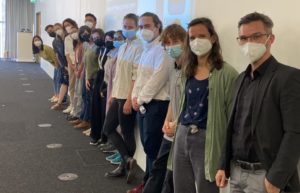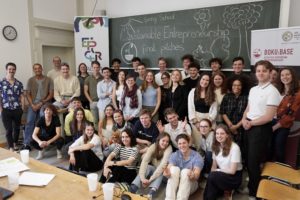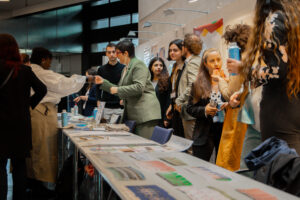EPIC Missions : the most recent course programme created by EPICUR
Would you like to…
- … travel to another EPICUR city?
- … help to tackle one of the big societal issues of our time with peers from all over Europe?
- … gather experience in working for a real-world client?
- … earn a certification carrying 8 or 12 ECTS credits?
and are you…
- … interested in working across disciplinary boundaries?
- … motivated and able to work in English?
- … a student at one of the eight EPICUR partner universities (minimum 2nd year)?
If yes, then apply now for one of the EPIC Missions and become a pioneer student at one of the first European Universities!
Apply now : https://learn.epicur.education/goto.php?target=cat_125
What are EPIC Missions?
EPIC Missions are group projects in which students from across Europe come together to solve real-world problems for real-world stakeholders with the academic support of their mission guides. They include blended mobility, which means that they start with a three-day physical (potentially hybrid) kick-off event in Freiburg followed by online collaboration throughout the mission period and possibly a physical reunion at the end.
The missions consist of two parts: a team mission carrying 8 ECTS credits (from December until April) and a solo mission carrying 4 ECTS credits (to be completed afterwards in one’s own time by August the latest). It is possible to only complete the team mission.
How does it work exactly?
The first round of EPIC missions will start with an in-person kick-off event in Freiburg from Thursday, 2 December until 5 December 2021 (subject to change due to the ongoing pandemic). Here, participants meet their fellow group members, their academic mission guides and the external stakeholders. Afterwards, participants have five months to work on their stakeholder’s problem as a group with the support of their mission guides. Four online check-ins with the mission guides are foreseen during this period. The final group deliverable is due in April 2022. Having completed the team mission, participants may take part in the solo mission in which they reflect on the problem as well as on the learning during the team mission and other connected learning experiences. Upon completion of the solo mission, participants will be invited to an in-person Capstone event where they will present their work.
What are these ‘problems’ you keep speaking about?
In the EPIC Mission, Bachelor students will tackle some of the big questions of our times on behalf of external stakeholders. In the first edition, the City of Freiburg and the German-American institute “Carl-Schurz-Haus” in Freiburg are the external stakeholders. The problems that these clients bring to the table are:
Mission 1 (Carl-Schurz-Haus, Freiburg): Across the Atlantic: How can art support relations between the EU and the USA?
[Track: European Identities]
Today, every one of us is faced with never-seen-before challenges and changes on a global scale. Things that were considered stable only a few Today, we are all faced with never-seen-before challenges and changes on a global scale. Things that were considered stable only a few decades ago have turned out to be fragile, such as the roles Europe and America play on the global stage. The strong post-war connections between and the supposedly shared values of the US and Europe have been crumbling on many levels. The Carl-Schurz-Haus in Freiburg has organised readings, exhibitions and courses dedicated to the relation and understanding between Germany and the US. Your EPIC Mission is to develop a concept for the Carl-Schurz-Haus that (1) demonstrates what cultural events and formats are most appropriate to depict today’s situation and (2) discusses how different target groups can be reached.
Mission 2 (City of Freiburg): Combining sustainable & smart: How can Freiburg promote green digitalisation? [Track: Natural and Societal Sustainability]
There are several challenges awaiting cities in the future: new urbanisation trends that reshape cities and their surroundings, changes in lifestyles and preferences, demographic developments, overburdened infrastructure, tourism, air and noise pollution, management of limited resources, etc. In many places around the world, city councils and private companies are trying to tackle such problems with manifold interconnected initiatives whose purpose is to build the infrastructure and services for the new cities of the 21st century. Your EPIC Mission relates to issues the City of Freiburg is trying to address: Would Smart City technologies have a benefit for Freiburg? How could they be made beneficial? And what is the perspective of different stakeholders on these technologies?
Who can take part?
All Bachelor students at EPICUR universities are eligible to apply from their second year onwards. Places are limited to 20 in this pilot edition.
But, how about the costs?
Participation itself is free. Furthermore, EPICUR will pay for your accommodation in Freiburg and will cover travel costs (final approval pending).
What’s in it for me?
You will have the invaluable experience of working on a societally relevant problem with peers from all over Europe and thereby add a truly European element to your studies. Furthermore, upon completing the mission you will receive certification for 12 ECTS credits (team + solo mission) or 8 ECTS credits (only team mission). You may also be eligible for an EPICertificate (currently in development) if you complete an additional 18 ECTS of relevant coursework, service learning and/or extra-curricular learning (tbc). Recognition of credits towards your study programme may be possible if approved by the responsible entity at your home university.
How do I apply?
You can apply through the EPICUR Inter-University Campus with your local university account. See the guidance document for more information. The deadline is 31 October and you will hear back from us early November. Please submit the following application documents:
– Short motivation statement (indicating which of the missions you are applying for)
– Proof of enrolment at one of the EPICUR universities
– Transcript of Records




